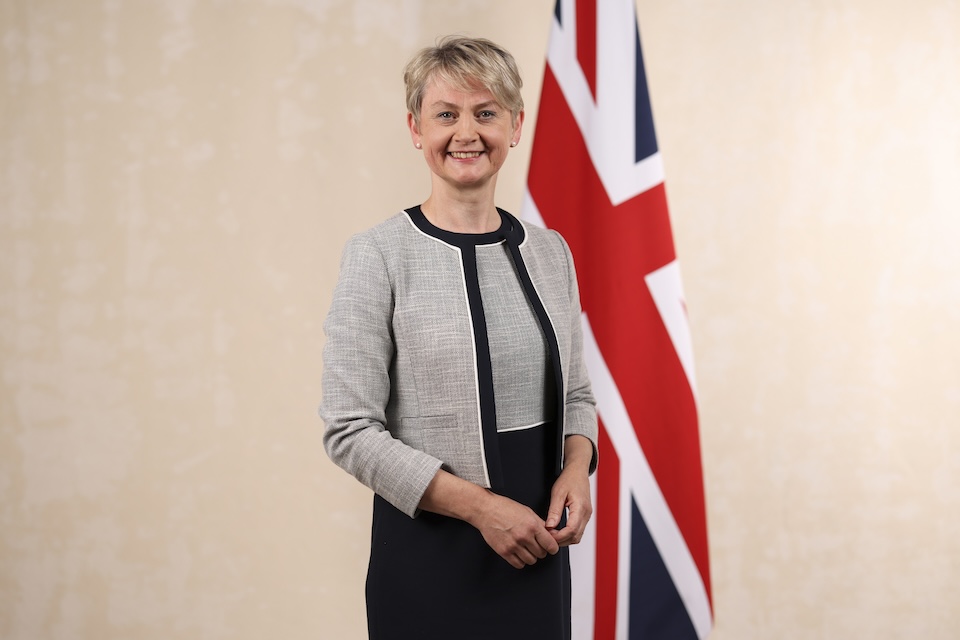Working with INTERPOL to deliver government priorities
The Home Secretary’s speech to the INTERPOL General Assembly in Glasgow on working together to deliver on government priorities.

Thank you very much, good morning. Thank you very much Mr President for your opening words. It is an enormous privilege and honour to welcome all of you here for the 92nd INTERPOL General Assembly.
And it’s a pleasure to welcome you to the magnificent and historic city of Glasgow – and let me thank our hosts for all the work that has gone into facilitating this hugely important event.
Can I thank the Interpol Secretary General, Juergen Stock for your years of service, leading this organisation’s vital work and we look forward to congratulating your successor tomorrow and for the future work that all of us need to do together.
At a time when networks of organised and serious crime span the world, it matters more than ever to have equally integrated and global networks of law enforcement agencies working together to fight crime, and to keep our communities safe.
The UK is proud to be at the heart of those efforts.
Every year, our INTERPOL bureau in the National Crime Agency sends out 20,000 requests to partners around the world, and every day, they manage more than 1,000 incoming messages.
And we see the impact of that cooperation here on our streets. Here on the streets, here in Glasgow.
Just 4 weeks ago, one of Britain’s most wanted men was jailed for leading a major drug gang responsible for importing tonnes of cocaine into this city in banana boxes from Ecuador– fuelling addiction and gang violence across Scotland.
Thanks to a joint operation between Police Scotland, and Dutch counterparts, the UK National Crime Agency, he was arrested in the Netherlands, extradited back to Scotland, and sentenced to 20 years in prison in Glasgow High Court.
International cooperation, work with INTERPOL, delivering results in real life. So to all those working with colleagues on similar operations in pursuit of our collective security – I want to say a heartfelt thank you.
Over the past century, the success of INTERPOL has been a testament to the critical importance of its mission, to the skill and professionalism of its members, and to the spirit of innovation that has evolved through decades of political, technological and social change.
But most importantly of all, INTERPOL’s success has been evidence of that enduring belief that, together, we are stronger.
Britain’s new government is committed to that principle, and – from fraud to drug-trafficking – we believe there are so many crimes and criminal networks which can only be tackled effectively through strong international policing cooperation.
And let me highlight just 2 areas where we want to see even stronger cooperation in the years to come. First, in tackling the global scourge of violence against women and girls and child sexual abuse.
The scale of which should continue to shame us all.
Britain’s new government has set a mission to halve violence against women and girls in a decade, but we know that cannot be achieved by working alone.
Perpetrators and predators across the world are being enabled and emboldened by new technologies, the use of which is growing at an alarming rate. The scale, complexity and severity of online abuse is increasing in every jurisdiction.
Tackling these tech-enabled harms is a central priority for the UK, and I am glad it will be one of the topics for discussion here this week.
We will only tackle these new threats through increased cooperation, and by committing to share not only the best intelligence but the best innovations to protect our children from harm.
And second, as you will hear shortly from our UK Prime Minister, we must also have a much stronger and more integrated global response to the organised immigration crime, which is growing around the world and profiting from human misery, putting lives at risk, undermining our border security, and destabilising our communities.
Here in the UK, our new Border Security Command is leading the fight against the criminal gangs who every week are crowding vulnerable people into flimsy dinghies on the coast of France, leaving dozens this year to drown or be crushed to death as they attempt to cross the Channel.
But we know those gangs operate not just on our shores, but all across Europe and beyond, a network of exploitation stretching around the globe
So we are also drawing up new agreements with our neighbours to strengthen law enforcement, disrupt supply chains, break the business models of the gangs and bring offenders to justice.
Because we know that the best way to strengthen UK border security is to work in partnership with other countries. Tackling the shared threats we all face, and preventing the growth of this transnational organised crime.
On this issue, and on so many others, the challenges we face may vary from nation to nation but the dangers are becoming ever more interlinked.
The lines between different threats are increasingly blurred.
And thanks to modern technology, the ability of crime groups to operate internationally has never been greater.
No single state can tackle these threats in isolation. International security and domestic security are two sides of the same coin.
That is why INTERPOL remains integral to public safety in every one of our countries.
That is why, under this government, Britain will always be an active partner and committed friend as we seek to make the world safer to all, and we thank all of you for being part of these efforts this week.
And we are fortunate to be led in our efforts in the UK by a Prime Minister who has spent many years leading national and international work to enforce the law, prosecute criminals and keep our communities safe.
So it is my great pleasure to introduce our Prime Minister Keir Starmer, to open up this Assembly today.
Thank you.